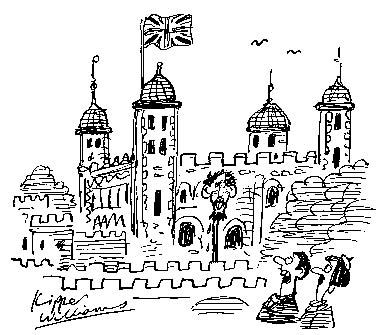Prince Andrew’s follies have shown the royal family who its friends are
To enemies of the monarchy, Prince Andrew presents the perfect target. He has an array of vices: a love of the high life, a weakness for unsavoury company, a painfully short list of achievements and a talent for finding his way into newspapers. His foreign trips have a reputation for misadventure, with diplomats sent to smooth the feathers he ruffles. To have the reputation of being rude is hardly fatal for a royal: the Duke of Edinburgh has almost made a virtue of it. But when convicted sex offenders, Kazakh billionaires and teenage masseurs were thrown into the mix, the anti-monarchists knew it was the perfect time to pounce.
It is a Labour MP, Chris Bryant, who has led the charge. The Prince, he says, should resign because he ‘is a bit of an embarrassment’ — this from a former vicar best known for posting a picture of himself in his underpants on a dating website. But Bryant’s mission is broader. When he was a Foreign Office minister, he said, he felt frustrated at the idea that the monarchy was immune from political attack. ‘A Labour administration tackling the royals would have led to charges of republicanism,’ he said. ‘Perhaps it might be easier for the coalition to take a stand.’ If last week was anything to go by, he will not be disappointed.
The anonymous briefing from government sources started immediately. Prince Andrew was acting as an unpaid trade envoy, ran the logic, so he should be treated like an ordinary politician. Vince Cable, the Business Secretary, said the Duke should ‘judge the position he is in’ and added, with menace, that ‘conversations will have to take place’. Another source said the government would shed no tears for the Prince’s departure. Even 10 Downing Street had joined this royal hunting session, with an unnamed official saying that Prince Andrew’s position would be ‘untenable’ if further embarrassing stories emerged.
The Prince, in other words, was being thrown to the wolves. This happens fairly regularly to politicians: anonymous character assassination followed by political burial. But to treat a member of the royal family in this way was extraordinary. When David Cameron turned up for work on Monday he recognised immediately what was happening, and called off the attack dogs. Even he, however, was struck by how quickly this clash happened. The Prime Minister is an instinctive monarchist, but is above all a politician first.
It was clear that the Prince Andrew episode had exposed a deeper tension between the political class and the monarchy.
One does not have to be a republican to cringe at Prince Andrew’s behaviour — the Queen herself is likely to be one of those most dismayed at how this has played out. Many of the criticisms are unwarranted, but it can hardly be said that the Prince stays out of danger. He has played into the hands of the monarchy’s critics. Ten years ago, the world knew about his reputation, and this was not a problem, because he was willing to act unpaid to use his royal cachet to act as a trade ambassador and open markets for British companies. Befriending the likes of Saif Gaddafi was an occupational hazard. His job was to knock on dodgy doors; he could not help who answered them.
But no British company asked that Prince Andrew stay four nights last December with Jeffrey Epstein. The two may have been friends for years, but when Epstein served an 18-month jail sentence for soliciting a teenage girl it was a sign that it might be better to limit their relationship to Christmas cards. When the News of the World ran photographs of the prince and the sex offender walking in Central Park, it looked bad. And when it emerged that the Prince solicited £15,000 from Epstein to help repay debts run up by his spendthrift ex-wife, Sarah Ferguson, it looked worse. To Prince Andrew’s allies, this is a depressingly recurrent theme. ‘She always needs money, and that’s why he hangs around with these characters,’ one says. ‘No one else will take her on, so she’ll cling to him until she dies.’
As the money available to the monarchy contracts under political pressure, its members need to adjust. The Queen already has. Other members of her family — current and estranged — find it harder. The question of how the monarchy finances itself poses inherent risks, raising the question of what the public finds acceptable. Alan Bennett put it well in The Madness of George III. ‘To be heir to the throne is not a position, it’s a predicament,’ the regent says. ‘People laugh at me. What must I do to be taken seriously? I tell you, sir, to be Prince of Wales is not becoming to a gentleman.’ This appears to sum up the Duke of York. What is a 51-year-old single father to do with himself?
To be a trade ambassador carries with it the accusation of being hungry for junkets. To enter business risks accusations of venality, and cashing in on one’s status. Members of the royal family need to adjust constantly to shifting ideas about how they should behave — with politicians and the media keen to decide where the boundary is drawn. And the media appetite for scandal poses as great a threat as the political desire to clip the monarchy’s wings.
In just over a generation, the age of deference has been replaced by the age of entrapment. The respect shown during the abdication crisis, when Fleet Street kept an astonishing number of secrets, has vanished. Nowadays, royals have their mobile phones hacked — as, notoriously, in the case of Prince William. Newspapers are now in the business of stings. Ten years ago, for example, a Spectator writer who a national newspaper hoped would catch Prince Andrew’s eye was asked by an editor to infiltrate a group of girls around the Prince and spy on him. (She turned down the assignment.)
The same newspapers that hope to make a killing from selling stories about the royal wedding will just as happily try to sell stories exaggerating the party-going habits of a prince. One can argue that it is not newspaper morals that have changed, but the public appetite for scandal. But whatever the reason, royals are given less and less leeway.
The decisions facing them are seldom clear-cut. To associate with Epstein after his conviction may sound like almost suicidal folly. But when the Prince had dinner with him last December, the other guests included the CBS anchorwoman Katie Couric, the renowned interviewer Charlie Rose and the film director Woody Allen. Why the forgiveness? ‘I’m not a sexual predator, I’m an “offender”,’ Epstein told the New York Post. ‘It’s the difference between a murderer and a person who steals a bagel.’ This may sound laughable in London. But Prince Andrew was not the only one who thought Epstein was safe company that night.
Had a member of the Cabinet accepted the hospitality of a convicted sex offender, they would have had to quit. Peter Mandelson lost his job over a £373,000 loan from a Labour minister to buy a home in Notting Hill. Prince Andrew sold his home, Sunninghill Park, for £3 million over the asking price to a Kazakh billionaire — and seems to have got away with it. All this infuriates a certain type of politician, who can’t so much as flip his mortgage, or buy a John Lewis flatscreen, without being pilloried. ‘I suspect that’s what’s behind my colleagues’ anger,’ says one of the more frugal Tory backbench MPs. ‘If they can’t behave like princes any more, then they don’t think a prince should be able to either.’
Perhaps the single most destructive move Clegg could make would be to subject the royal household to the Freedom of Information Act. If this happens, then everything from caviar receipts to private correspondence would be released. The furore over MPs expenses gives a taste of the havoc this could cause. ‘The monarchy’s mystery is its life,’ wrote Bagehot in 1867. Its enemies agree. And freedom of information laws are a tool to end this mystery. Already, the Guardian is fighting a court case to have the government release Prince Charles’s letters to ministers.
Buckingham Palace is strangely good at adapting to changing political circumstances. In almost six decades, the Queen has had only two problems of note. The first was when she was slow to respond to the 1966 Aberfan disaster, where a collapsing colliery slag heap crushed a school in a Welsh village. The second was about her response to the death of Diana — made into a film, The Queen (which, I gather, she still hasn’t watched). After each mistake, she overhauled the way Buckingham Palace is run, making sure she is just close enough to her subjects, but not so close that she intrudes. Her reign shows that there are three secrets to a successful monarchy: don’t leak, stay out of politics and strike the right balance between regality and excess.
When royals break these rules, as we have seen, trouble very quickly follows. And there will be more trouble in store. It is said of the Queen that she can talk frankly to the Prime Minister in their weekly private meetings precisely because she says nothing in public. This cannot be said of her son. If the Prince of Wales’s frenetic letters to Labour ministers become public, it is certain to lead to charges of his political interference — charges that could not, at any point, have been made of his mother. Strangely, our 84-year-old Queen has set a template for how a monarchy should handle the digitised world of 24-hour news.
Prince William will have been watching his uncle’s travails with discomfort. The royals must watch the company they keep, expecting their every move to be monitored and even their phones to be tapped. The lesson of the Prince Andrew saga is simple: the royal family must be more cautious than ever before. Prince William and Kate Middleton will face more pitfalls than perhaps any couple previously in their position. The royal family may have approval ratings that political parties can only dream of. But as we have seen, its enemies are always ready to pounce.






Comments